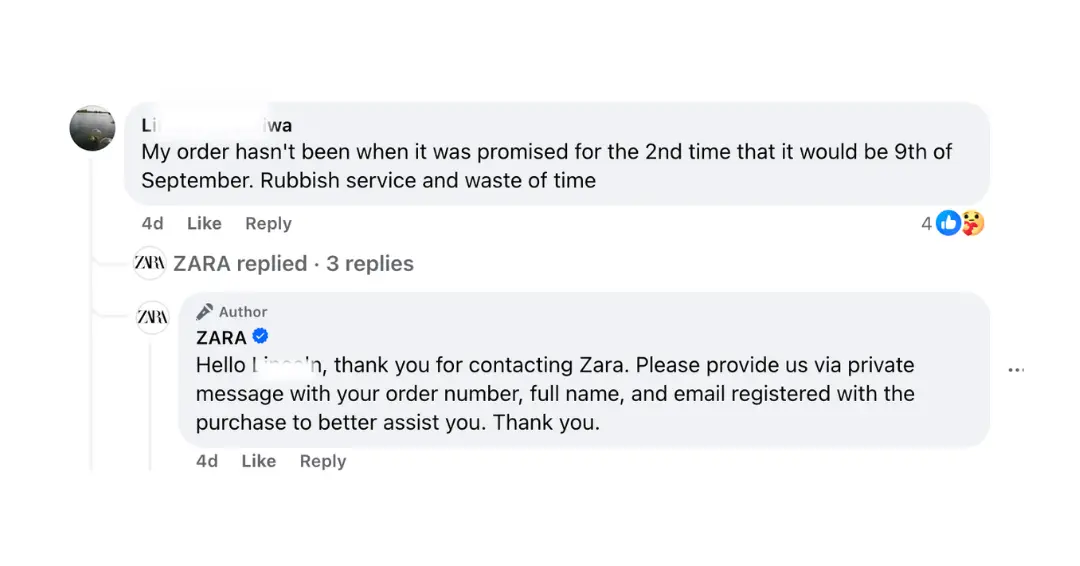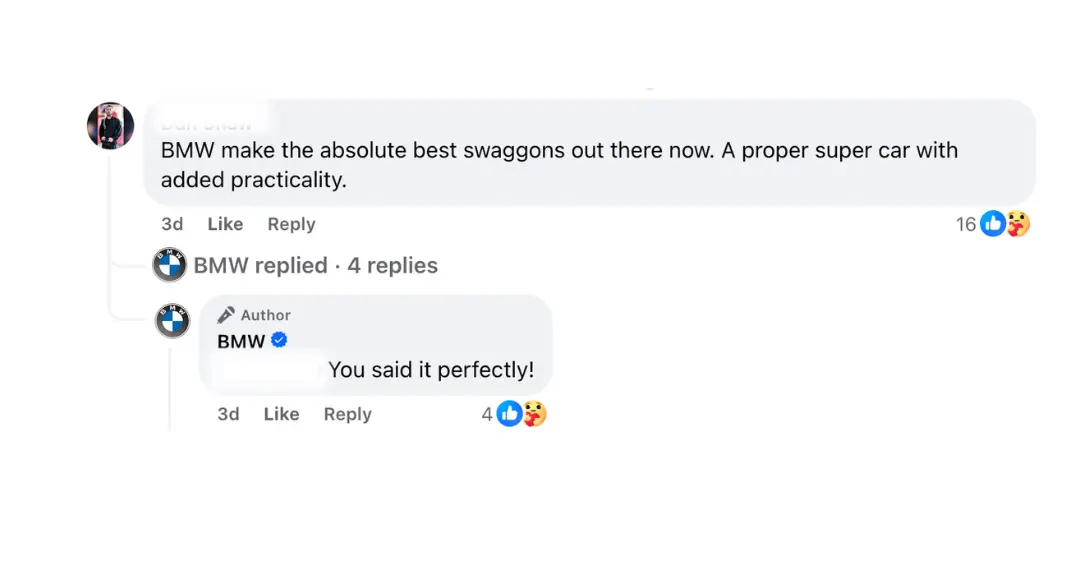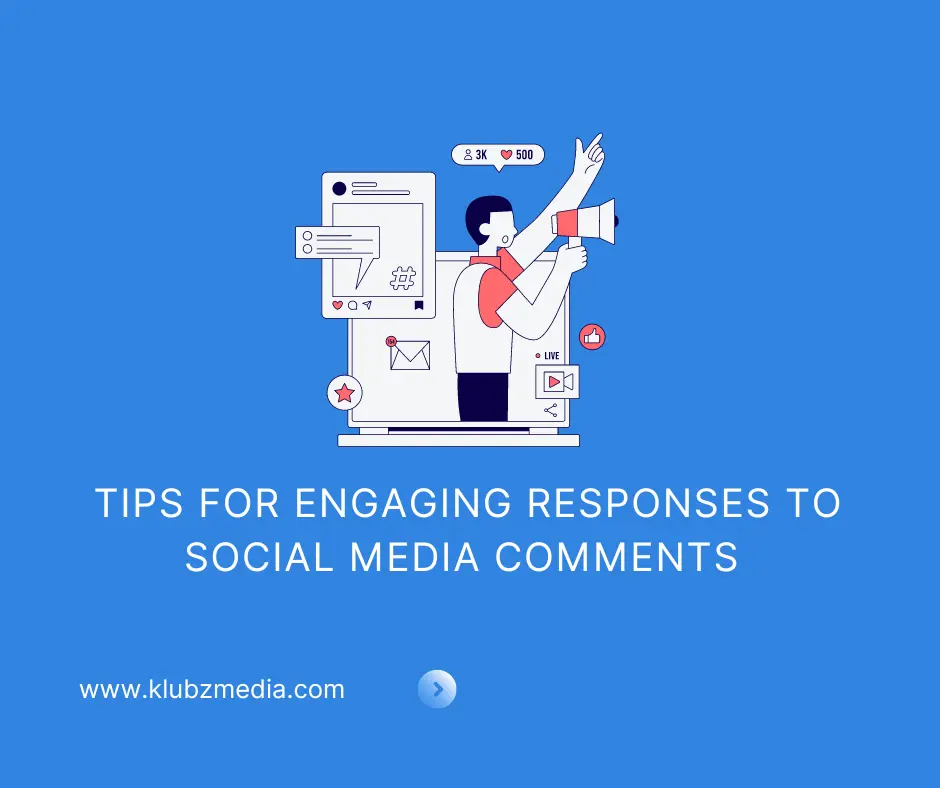Social media comments are user-generated messages posted on social media posts in response to the content posted on social media platforms. They are normally used for expressing opinions and asking questions.
Social media comments can significantly influence your social media management strategies and growth, so knowing how to respond to them properly is important. If you respond properly, you may engage in further conversations with your audience increasing your account engagement.
The social media algorithm will pick up a post that gains a certain amount of engagement, which increases the post’s reach and further interaction. Let’s learn how to respond to social media comments.
Reasons Social Media Comments Are Important
Social media comments give rise to conversations and feedback which can build a stronger community for your audience. They provide necessary information and insights to improve further posts. In summary, social media comments can influence the behavior of your audience and help you to establish a steady reputation. Precisely social media comments can be important for gaining thus :
- Engagement: Social media comments are a certain type of social media engagement in which people comment on a post using text, emojis, hashtags, or @ mentions. Comments can boost engagement by allowing users to offer their ideas and opinions. They also allow your audience to start or take part in an online discussion about the post
- Insights: Insights into what your audience thinks about your company, products, services, and posts can be drawn from social media comments. It is also possible to improve the quality of your products and services, introduce new ones, and develop targeted marketing campaigns using this data. Enhancing your social media presence through this information will increase positivity among your followers.
- Brand sentiment: Analyzing comments on social media can boost customer satisfaction and your brand image by pinpointing areas for enhancement and proposing solutions. Tools for sentiment analysis employ machine learning and natural language processing to gauge users’ feelings or viewpoints when assessing social media content. This data aids in spotting emerging trends and adjusting marketing strategies.
- Conversions: Social media comments can help in understanding whether the audience is interested in the post or not. Most visiting users will prefer to question before supporting your social media account. Responding to such comments will help convert visitors into loyal audiences by helping them get a better understanding of your social media account.
- Visibility: Comments on social media platforms alert the algorithm that your post is worth sharing. Responding to comments will gain more visibility as well as reach.
- Loyalty: You will be able to achieve greater loyalty and satisfaction from your audience if you respond to comments made on social media platforms. This will serve to demonstrate to your audience that you appreciate their thoughts. Engaging with comments on social media can also help you to build connections with your audience.
Social media is a public platform, and bad feedback can harm your reputation. You may mitigate the harm and demonstrate your dedication to client happiness by reacting to unfavorable comments quickly and properly. Being able to respond in engaging ways helps to not only increase account engagement but also connect more with your audience. It is a great way to build up your account’s reputation and increase likes and shares.
Social Comment Responses Based on Types
It is important to understand different types of comments to learn how to respond to social media comments. Comments on social media can vary in two ways based on the context. They can either be in support of your post or oppose your post, Those whose comments show positivity are known as positive comments, On the other hand, comments which show negativity towards a post are known as negative comments. Negative and Positive comments are the two sides of the same coin. Some other types of comments are also known as neutral comments which show neither support nor criticism towards a post. Some more information on this subject is given below,
Negative comments

Comments expressing hatred, denial, complaint, criticism, and so on are considered negative on social media. It is entirely normal for you to receive nasty remarks. Such comments can be made for a variety of reasons, and it is critical to fully comprehend them and respond appropriately. Responding properly to a negative statement might help turn it into positivity.

Some examples of negative comments on social media and how to respond to them are shown below:
Comment: “I hate this post “
Response: “We are sincerely sorry for your experience with our post. We will work on improving our future posts.”
Comment: “This doesn’t even seem legit”
Response: “Dear user, We can completely assure you that all our services are genuine. It would be appreciated if you would mention which part of our post makes our services look false.”
Comment: “You’re post violates my rights”
Response: “We are deeply sorry for our post violating your rights. It was completely unintended and we will do our best to make sure this does not happen again.”
Comment: “I am facing issues with your services”
Response: “Dear customer, You can contact our customer care for any issues that you face with our services.”
How to Respond to Negative Comments
Here’s a guide to professionally responding to negative comments on social media.
1.Acknowledge the Concern
Express your gratitude for their comment and acknowledge their issue or concern.
- Example 1: “Thank you for bringing this to our attention. We appreciate your feedback and understand your concerns.”
- Example 2: “We’re sorry to hear about your experience. We take all feedback seriously and are committed to improving.
2. Apologize (if appropriate)
If possible it is always suggested that you offer an apology.
- Example 1: “We apologize for any problems our post may have caused. Your satisfaction is important to us.”
- Example 2: “We’re truly sorry for the experience you’ve had. This is not the standard we are striving for.”
3. Provide a Solution or Next Steps
Explain how you plan to address the issue or suggest a way to resolve the problem.
- Example 1: “We’d like to make it right. Could you please DM us with more details so we can further assist you?”
- Example 2: “Our team is looking into this matter, and we will reach out to you with a solution as soon as possible.”
4. Encourage Further Discussion (Personally)
Invite the commenter to continue the conversation in a private setting to resolve the issue effectively and maintain confidentiality.
- Example 1: “Please send us a direct message with your contact details, and we’ll get back to you shortly.”
- Example 2: “We’d like to discuss this further with you. Could you please contact our support team at [email/phone]? We’re here to help.”
5. Thank Them for Their Patience and Understanding
End the response on a positive note, reinforcing the company’s commitment to customer satisfaction.
- Example 1: “Thank you for your patience as we work to resolve this issue. We value your feedback and are committed to providing a better experience.”
- Example 2: “We appreciate your understanding and are dedicated to ensuring that your concerns are addressed promptly.”
Additional Tips
- Stay Positive and Professional: Maintain a respectful and courteous tone, even if the comment is harsh or unfair.
- Avoid Arguing or Being Defensive: Focus on resolving the issue rather than defending your company or product.
- Be Concise: Keep your response clear and to the point to avoid any misunderstandings.
- Follow-Up: Once the issue is resolved, consider following up with the commenter to ensure they are satisfied.
Some More Examples of Negative Comment Responses
Example 1: Service Complaint
- Comment: “I waited for over an hour and still didn’t get any assistance. This is unacceptable!”
- Response: “We apologize for the delay you experienced and understand your frustration. Please send us a direct message with your details, and we will prioritize resolving this issue. Thank you for your patience.”
Example 2: Product Quality Issue
- Comment: “The product I received is not what I expected. The quality is very poor.”
- Response: “We’re sorry to hear that our product didn’t meet your expectations. We’d like to make things right. Please contact us directly so we can arrange for a replacement or refund. We appreciate your feedback and will use it to improve our offerings.”
Example 3: Negative Review
- Comment: “I’m disappointed with the service. I won’t be coming back.”
- Response: “We’re sorry to hear about your experience. We value your feedback and would like the opportunity to improve. Please reach out to us via direct message so we can discuss how to make things right for you.”
By using these strategies and responses, you can effectively manage negative comments on social media while maintaining a professional and positive brand image.
Positive Comments

Comments expressing support, acceptance, suggestions, and relatability on social media are considered positive comments. Positive comments refer to favorable feedback and opinions from your audience. Any reviews, or ratings received from customers regarding their experience with a product or service being in support of your post. This feedback typically highlights the sides the audience found satisfactory.

Some examples of positive comments on social media and how to respond to them are shown below:
Comment: “I love this post “
Response: “We appreciate your support, It means a lot to us.”
Comment: “Great just as expected”
Response: “Dear user, We are glad that we were able to reach your expectations. “
Comment: “That’s some good information, it would’ve been better if you added some more details”
Response: “We are very thankful for your suggestion. We will try our best to further detail our posts from now on.”
Comment: “Great work”
Response: “Thank you for supporting our work, We are grateful for the support.”
How to Respond to Positive Comments
Responding to positive comments on social media is a great way to engage with your audience, show appreciation, and strengthen relationships. Here are some strategies and examples for responding effectively:
- Thank Them for Their Support
Acknowledge the positive comment and express your gratitude.
Examples:
- “Thank you so much for your kind words! We really appreciate your support.”
- “Thanks for the love! It means a lot to us.”
- “We’re thrilled to hear that you enjoyed our post. Thank you for the support!”
2. Personalize Your Response
Use the commenter’s name and address specific points they mentioned to make your reply feel more personal.
Examples:
- “Thanks, [Name]! We’re glad you enjoyed our new product.”
- “[Name], we’re so happy to hear that you found our tips helpful!”
- “Your support, [Name], motivates us to keep going. Thank you!”
3. Add Value or Information
Provide additional information, resources, or a call to action that the commenter might find useful.
Examples:
- “Thank you for your support! If you liked this post, you might enjoy our latest blog article on [topic].”
- “We appreciate your feedback! Stay tuned for more updates like this.”
- “Thanks for the compliment! If you have any suggestions, feel free to share them with us.”
4. Encourage Further Interaction
Invite the commenter to continue engaging with your content or ask them a question.
Examples:
- “Thank you! What part of our post did you enjoy the most?”
- “We’re glad you liked it! Have you tried any of our other products?”
- “Thanks for the positive feedback! Is there anything else you’d like to see from us?”
5. Highlight Shared Values or Goals
If the comment aligns with your brand’s values or goals, highlight that connection.
Examples:
- “Thanks for noticing our efforts towards sustainability! We’re committed to making a difference.”
- “We’re glad our message resonates with you. Together, we can make a positive impact!”
- “Thank you! We believe in [value/mission], and it’s great to see our community feels the same.”
6. Be Authentic and Genuine
Keep your tone sincere and reflect your brand’s voice. Avoid overly scripted responses.
Examples:
- “Wow, thank you so much! Your comment made our day!”
- “We’re overjoyed to hear that! Your support is everything to us.”
- “Thank you, it’s comments like yours that keep us going!”
7. Acknowledge Their Loyalty or Support
If the commenter has been a longtime supporter or customer, acknowledge their loyalty.
Examples:
- “Thank you for sticking with us, [Name]! We’re lucky to have you in our community.”
- “We appreciate your continued support, [Name]! It means the world to us.”
- “Thanks for being a loyal follower, [Name]! We’re grateful for your trust and support.”
8. Keep It Brief and Relevant
While it’s important to show appreciation, keep your responses concise and to the point.
Examples:
- “Thanks so much, [Name]!”
- “Appreciate your support!”
- “Glad you enjoyed it, thank you!”
9. Use Emojis Appropriately
Emojis can add a friendly and approachable tone to your responses.
Examples:
- “Thank you for the kind words! 😊”
- “We appreciate your support! 🙌”
- “Your feedback made our day! ❤️”
10. Invite Them to Share
Encourage the commenter to share your content with others who might find it valuable.
Examples:
- “Thanks a lot! Feel free to share this post with anyone who might find it interesting.”
- “We’re glad you liked it! Spread the word by sharing this with your friends.”
- “Thank you! We’d love it if you shared this with others.”
How Social Comment Responses Vary Based on the Platforms
Responses to comments can vary from different social media platforms. To learn how to respond to social media comments you have to first understand how responses can vary from different platforms. The most popular social media platforms right now are:

Facebook is a social media platform that allows users to connect. Facebook is currently the world’s most used social media platform. Commonly used by adults mostly female.
Facebook’s content contains pictures, videos, and reels posted by users. Posting on Facebook allows other users to watch, share, and comment on your post. It is important to understand what type of comments your post is generating to properly respond to them.
The comments can be responded to via the comment box or you could create a post in response to another user’s comment based on what type of comment it is. It is advised that all responses be made cautiously and respectfully.
Youtube
YouTube is a video-sharing platform on which you can create an account for free and start posting videos anytime you want! Commonly used by GenZ and Millenials.
The social media platform’s main content base is videos. Which generates views and
comments by viewers who usually express how they feel about your post in either a negative, positive, or neutral way.
You can respond to comments directly in the comment box based on their comment or you could also make a video in which you respond to the comments commonly known as a QNA based on the comment. It is advised that all responses be made cautiously and respectfully.
Instagram is a social media platform that allows users to upload content based on photo and video sharing with their followers. The platform is commonly used by teenagers.
The platform mainly consists of content such as reels and posts. Comments on Instagram are usually emojis or feedback to the post and can sometimes be a mix of both.
Just like Facebook you can respond to the comments from the comment box or post your response to the comment through a video or a story. It is advised that all responses be made cautiously and respectfully.
Tiktok
TikTok is a social media platform that shows you content based on what you are interested in. It’s commonly used by all sorts of people to spend their free time as it creates a personalized video feed based on people’s interests.
Comments on TikTok are usually in response to the post. Most comments on TikTok consist of emojis, opinions, and feedback.
You can answer all the comments on TikTok easily through the comment box or post a reel in response to the comment. It is advised that all responses be made cautiously and respectfully.
Snapchat
Snapchat is a multimedia instant messaging platform. The platform is used to share multimedia messages named “snaps” with other users.
Comments on Snapchat are usually done by sending a snap in response to another snap.
You may share multimedia content on your account in response to a snap you received or personally send snaps to another user. It is advised that all responses be made cautiously and respectfully.
Pinterest is a popular social media platform that allows users to share and view visual content posted by other users. The platform’s main users are adults who love exploring different aesthetics.
The comments on Pinterest are usually in response to the post, expressing how someone feels about the post.
You can respond to the comments received on Pinterest in many creative ways in the comment box. It is advised that all responses should be made properly and respectfully based on the comment.
X(Twitter)
Twitter now known as ‘X’ is a social networking and microblogging site allowing users to post multimedia content and reply to short messages known as “Tweets”. The site is most commonly used by people aged from a teenager to an adult.
Comments received on Twitter can be reposted or found in the comment box, which you can easily respond to judging from the comment posted. It is advised that all responses be made cautiously and respectfully.
Quora
Quora is a QNA social media platform where users ask and answer questions.
The platform is used by all types of people. Quora is exclusively used for surveys to provide entertainment.
You can use Quora for diverse questions you need answers to or you could simply answer other users’ questions. You could also read long answers to different questions enhancing your knowledge and perspective on many different things.
The common comments you can receive on Quora are answers to your questions. You can respond to such comments with gratitude for the answers or thank the audience for at least trying. It is advised that all responses be made cautiously and respectfully.
Final Statement
The In short, social media comments are more than just random thoughts—they’re a chance to connect, listen, and build trust with your audience. Engaging with comments opens the door to real conversations, helps you understand what people think, and strengthens your community. If you’re not paying attention to them, you’re missing out on valuable insights that can help your brand grow.
Get in touch with Klubz Media to see how we can help you make the most of your social media engagement.


